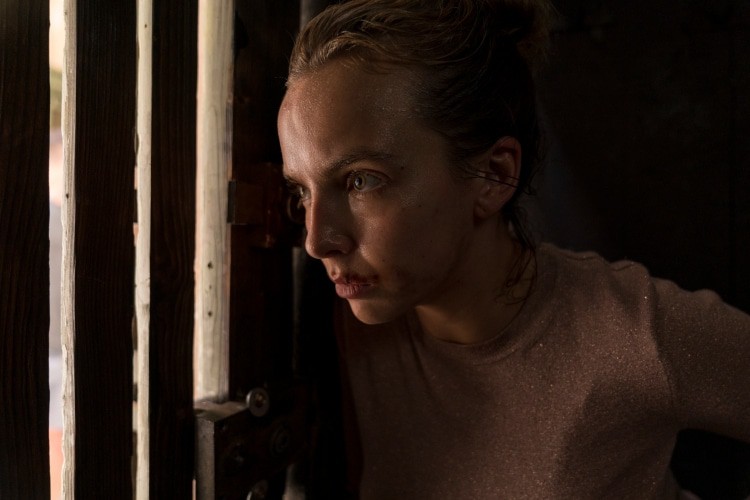Villanelle is not interested in good people. Their signs of banal decency–Crocs, minivans, matching pajama sets–make her gag. At best, she rolls her eyes at these people, and at worst, she kills them for fun. Killing Eve’s international assassin treats earnest emotions like a show put on just for her, perhaps because she’s used to performing feelings so well herself. As played by Jodie Comer, the playful psychopath mixes delight and disdain so frequently that it’s hard to ever pin her down enough to judge her as anything beyond a source of pure entertainment. She’s in some sense a spiritual successor to Orphan Black’s Helena, forgivable murder after murder because she’s so damned watchable.
The antagonist of Phoebe Waller-Bridges’ hit thriller series knows she’s eye-catching; season two offers Villanelle even more chances to slide into chameleonic undercover performances, almost all anchored in male expectations of feminine fragility. She bats her lashes, cries, and plays vulnerable, young, or unintelligent because she knows a certain type of men will eat that shit up. More often than not, she hurts them after; she’d be a quasi-feminist avenging angel, except that–as if in defiance of exactly those type of vigilante accolades–she also kills those boring, nice folks we can’t help but empathize with.
While Sandra Oh won a well-deserved Golden Globe for her performance as eager and obsessed government agent Eve Polastri, Comer went largely unnoticed throughout award season. Despite this, the series writers seem to recognize her unpredictable character, who Eve describes in an upcoming episode as “flamboyant, attention seeking, instinctive, spoiled, [and] easily bored,” as their crazed ace in the hole. The cast, which also features Fiona Shaw as Eve’s enigmatic boss, will be rounded out in season two by series newcomers Nina Sosanya, Edward Bluemel, Henry Lloyd-Hughes, and Shannon Tarbet.

Villanelle isn’t interested in good people, but bad people bore her almost as much. The machinations, agendas, and nefarious mustache-twirling of other villains don’t impress her, but rather exhausts her. The assassin, who at the end of last season disappeared after Eve stabbed her while the two lay in bed together, is at a disadvantage in these new episodes. She’s beholden to other bad guys and aching to get back into her and Eve’s game, a Hannibal-esque relationship with love notes communicated via crime scenes. In fact, Oh’s Eve seems to be the only thing that interests her.
Eve may not be particularly interested in good people either, but she’s certainly stuck with them. She’s struggling to get back to her life after her bloody encounter with Villanelle, but her husband and coworkers seem like white noise in comparison to her blistering relationship with the woman she’s been hunting. Parallel editing makes comparisons between the two more clear than ever; they’re like a double-sided coin, their sameness a surprise and a secret. Still, the seduction of heroism, organized and familiar in the form of MI-5, tugs at Eve nearly as much as Villanelle’s delicious chaos. Fans who wished the two would’ve run off together at the first season’s end should be prepared for the long haul, as the two women appear locked in a psychological dance with plenty of steps ahead of them.

The series seems certain to continue to explore female power, obsession, and violence, but writers would do best to let the leads’ layered relationship grow and breathe organically rather than pushing the pair apart for the sake of extending a tightrope of tension. These first two new episodes–penned by new head writer Emerald Fennell yet still indicative of the tone set by Waller-Bridge–are at times goofier and more offbeat than last season’s, but also take at least one narrative risk that surely won’t please everyone. People will no doubt argue, as they do with every show, over whether or not Killing Eve is a timely feminist series. The show’s dogged pursuit of revealing the good, bad, and whatever within each of us, a messy assortment of human parts that are perhaps neither entirely worth discarding or saving, answers that question better than any particular plot point.
Airing on BBC America (season two will also be simulcast on AMC), Killing Eve gained new viewers every week last season for good reason. The show nearly always makes the most surprising choice, busting down our expectations and rebuilding the foundations to create its own narrative language. At one point, a character with dementia mistakes Villanelle for someone else, asking her, “How’s Deb?” Playing along or correcting the woman seem like the only two options, yet instead, Villanelle answers, without missing a beat, “Deb got fat.” Like this line, the show itself is always a bit more strange and caustic than expected.
We underestimate the thriller at Killing Eve’s core thanks to its starkly breezy tone and a character dynamic that plays on our inherent biases, setting us up to expect an eventual turn toward romance or friendship between the two leads. Luckily, the show is kind enough to remind us as often and creatively as it can that murder is these twos’ only love language.
The post ‘Killing Eve’ Season 2 Review: Murder is Villanelle’s Love Language appeared first on Film School Rejects.
0 comments:
Post a Comment